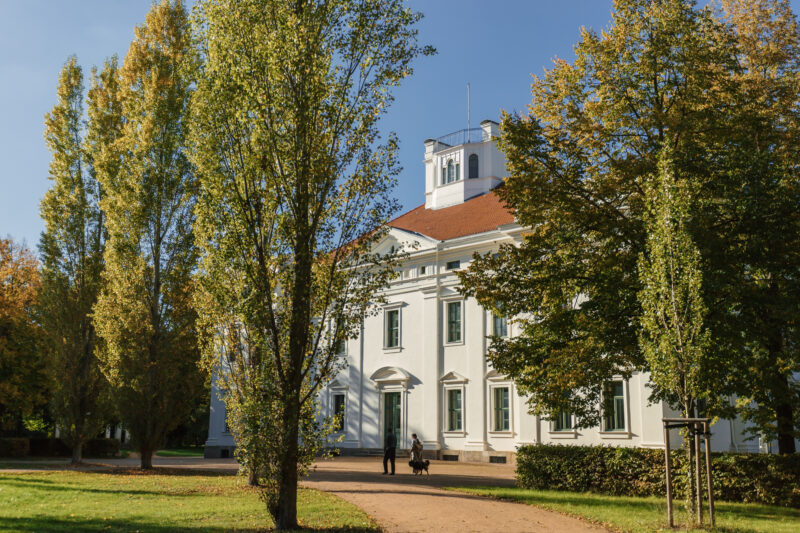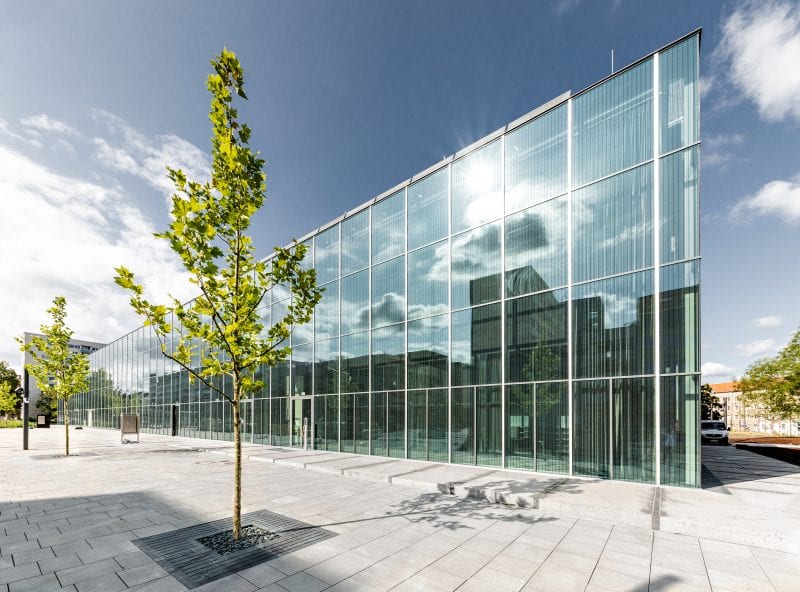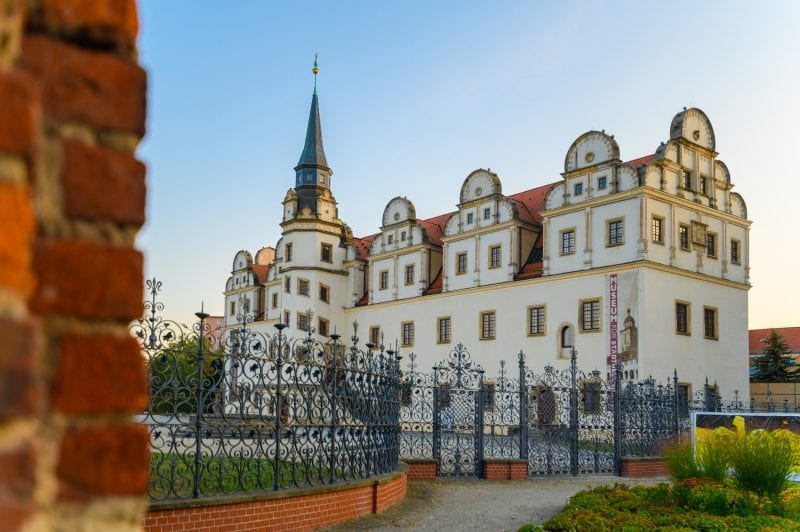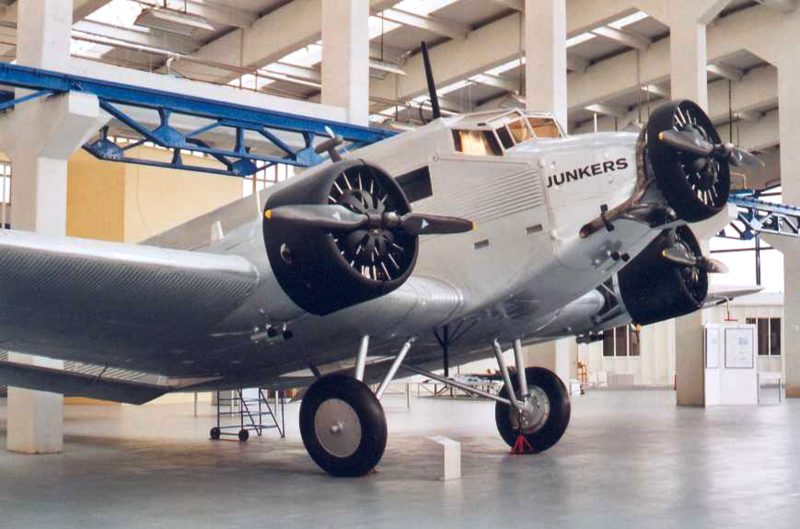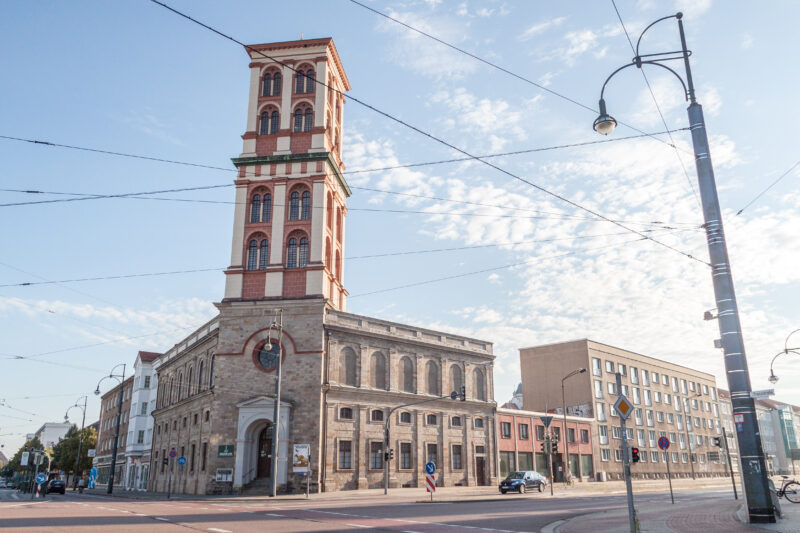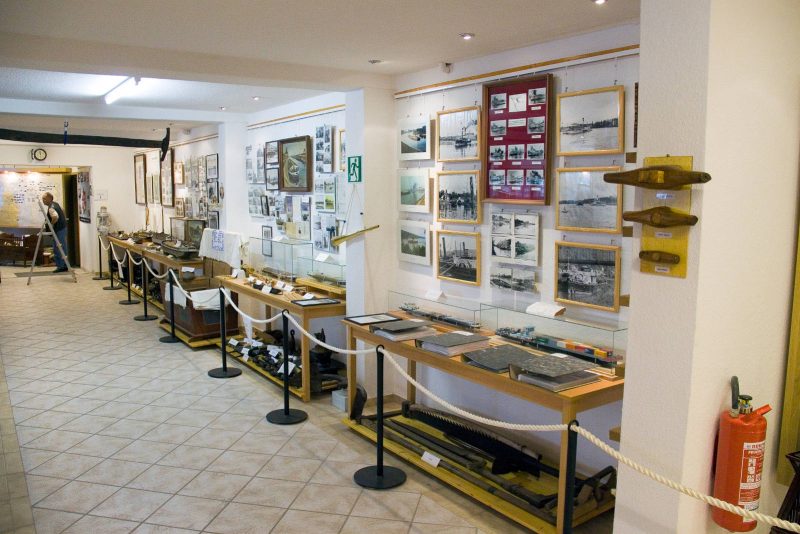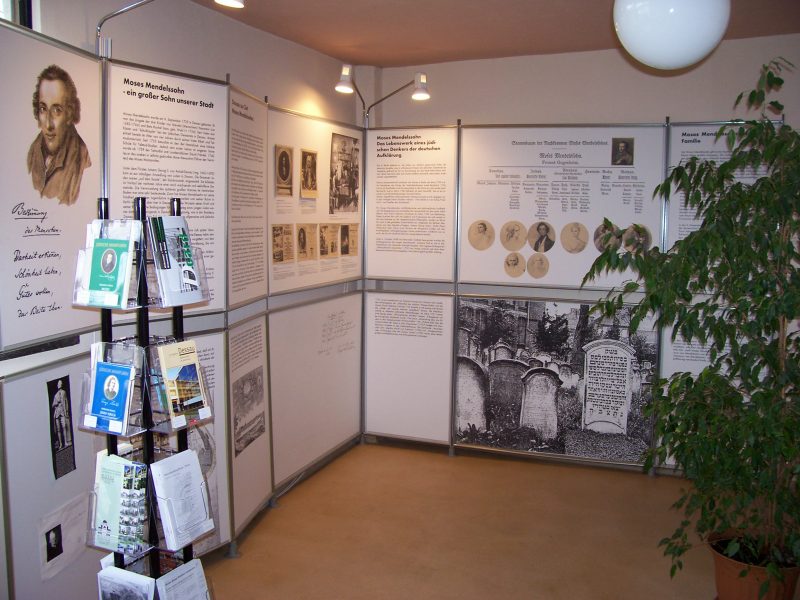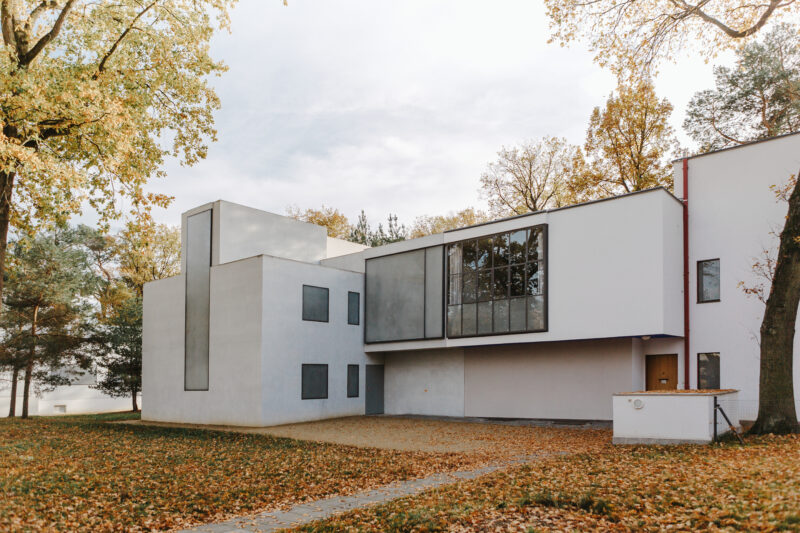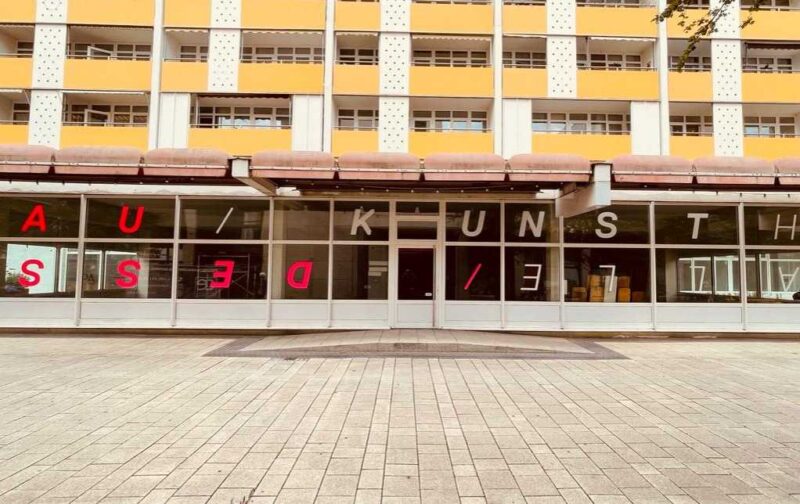Visit Dessau / Art and Culture / Museums and Galleries
Live history and discover art
Dessau-Rosslau boasts some very diverse museums. Here, you’ll encounter historic planes, princes, Enlightenment philosophers, composers, architects and even a Stone-Age lady.
From the German Renaissance painters and Flemish masters in the Anhalt Art Gallery through to contemporary art in changing exhibitions, Dessau-Rosslau offers huge variety. Let yourself be surprised.
Anhalt Art Gallery Dessau
For over 70 years, Georgium Palace, a UNESCO World Heritage Site, has been the home of the Anhalt Art Gallery Dessau (Anhaltische Gemäldegalerie).
The Anhalt Art Gallery Dessau, founded in 1927, has its origins in several older Anhalt collections, mostly of princely provenance. Its painting collection focuses on Dutch painting from the 15th to the 18th century and German painting from the 15th to the early 19th century, including major works by Lucas Cranach the Elder. The rich graphic collection unites drawings and prints from the 14th century to the present.
Anhalt Art Gallery
Puschkinallee 100, 06846 Dessau-Roßlau
Public transport: Bus lines 11, 12, 17, Stop Puschkinallee/Tierpark
Dessau Central Station, 500 m by foot
Wed — Mon 10.00 a. m. — 6.00 p. m.
Please note that admission takes place in defined time slots for which fixed ticket quotas are available.
- single ticket 8,50 €
- reduced ticket 5,50 €
- evening ticket (after 5.00 p. m.) 4,00 €
- free entrance with the WelterbeCard
- free entrance every wednesday
Bauhaus Museum Dessau
Bauhaus Museum Dessau presents the outstanding collection of the Bauhaus Dessau Foundation in a permanent display which is open to the public. Located in Dessau’s town centre, it was built to plans by the Spanish firm of architects González Hinz Zabala and opened in September 2019.
The centrepiece is the Black Box, designed to house the treasures of the new Bauhaus Museum. And the Bauhaus Dessau Foundation has a wealth of such treasures to draw on: with more than 50.000 exhibits, its collection is the second-largest in the world on the Bauhaus. The foyer is freely accessible and is used as an open stage for contemporary artistic ideas and events.
The exhibition in Bauhaus Museum Dessau is entitled Versuchstätte Bauhaus. Die Sammlung (“The Bauhaus as a place of experimentation. The collection”). It describes the Bauhaus as a lively place where people learned and taught, conducted artistic experiments and worked on industrial prototypes. The collections consist mainly of students’ work, records of lessons, and designs and prototypes from the workshops.
This is why the exhibition Versuchsstätte Bauhaus focuses not on the famous design icons and their masters, but on the school and its students: the routine learning and teaching between free design and industrial prototype, artistic experimentation and economic pressure, training centre and place of emancipation. The themed sections concentrate on the teaching concept and actual teaching, the Bauhaus as a versatile “testing ground”, a partner of industry and an avid communicator.
Bauhaus Museum Dessau
Mies-van-der-Rohe-Platz 1, 06844 Dessau-Roßlau
Public transport: Central stop Bauhausmuseum
Tue — Sun 10.00 a. m. – 5.00 p. m.
Before visiting, you must purchase an online ticket.
- single ticket 8,50 €
- reduced ticket 5,50 €
- guided tours (in German)
7,00 € plus admission
Dates: Wed + Sat 1.00 p. m.
Town History Museum
The permanent exhibition entitled Schauplatz vernünftiger Menschen – Kultur und Geschichte in Anhalt-Dessau (“A theatre of reasonable people – culture and history in Anhalt-Dessau”) puts the spotlight on the 800 years of history and culture of Dessau and its surrounding region, with its wealth of famous people and innovations. Often enough, the impetus for new developments in Germany and the whole of Europe originated here.
The Town History Museum is located in the Johannbau, an important witness to the early Renaissance. It is the only surviving wing of the palace of Dessau (Stadtschloss), the seat of the princes and dukes of Anhalt, which was badly damaged in World War II. The Johannbau with its remarkable stair tower was restored in the late 1990s.
With numerous exhibits, models, films and an interactive multimedia show, it presents history in an exciting and contemporary way. One exhibit, for example, is a model of the Dessau synagogue, which was destroyed in 1938. The teaching models from the Dessau Philanthropinum school, founded in 1774, are unique.
In addition, the museum is showing the overarching exhibition of the project Gemeinsam sind wir Anhalt (“Together, we are Anhalt”), in which seven history museums from the region of Anhalt and the Jever Palace Museum (Lower Saxony) are participating.
Dessau Town History Museum is accessible to people with disabilities. All the exhibition texts are translated into English in abbreviated form.
Museum für Stadtgeschichte
Schloßplatz 3a, 06844 Dessau-Roßlau
Public transport: Bus line 16, Stop Rathaus
Wed — Sun 10.00 a. m. — 5.00 p. m.
Closed in December and January.
- single ticket 4,50 €
- reduced ticket 3,50 €
- free entrance with the WelterbeCard
Technology Museum
"Hugo Junkers"
A silver skin made in corrugated aluminium sheeting, three mighty radial engines – the Ju 52, familiarly known as “Aunt Ju”, is one of the most famous aircraft ever. A lavishly restored original forms the centrepiece of the exhibition in the Hugo Junkers Engineering Museum.
The name of the engineer and technological visionary Hugo Junkers is every bit as inextricably associated with Dessau as the Bauhaus. From 1888 until his expropriation by the National Socialists in 1933, he and the Junkers factory played a decisive role in shaping the industrial development of Dessau and the Free State of Anhalt.
Junkers and his staff also provided crucial impetus for innovations in aircraft and engine construction and working and living conditions, as well as in research and teaching. The Engineering Museum shows many of these very different pioneering developments.
Besides the Ju 52 and the replica of an F 13 – the world’s first civil all-metal aircraft – these include gas boilers as well as engines. The exhibition also describes the early days of civil aviation.
One very special item in the exhibition hall is the only surviving all-metal test chamber built by Prof. Junkers. Metal furniture items bear witness to the fruitful collaboration with the Bauhaus Dessau.
In immediate proximity to the museum hall are further Junkers buildings, such as the administrative office block, a wind tunnel, and part of the runway of the former factory airfield.
Technikmuseum „Hugo Junkers“ Dessau
Kühnauer Straße 161a, 06846 Dessau-Roßlau
Public transport: Bus lines 12, 17, 471, Stop Finanzamt
March — October
Mon — Sun 10.00 a. m. — 5.00 p. m.
November — February
Mon — Sun 9.00 a. m. — 4.00 p. m.
Closed on December 25th and 26th and on January 1st.
- single ticket 7,00 €
- reduced ticket 3,50 €
- Families (2 adults, 2 children) 17,00 €
- free entrance with the WelterbeCard
Museum of Natural History and Prehistory
The museum shows exhibitions and collections on geology, ecology, humanity and the environment.
The permanent exhibitions focus on the Stone and Bronze Ages in the Middle Elbe region, Dessau and its region between the Germanic period and the Middle Ages, Middle Elbe floodplain landscapes, valuable exhibits from the mineral collections and a geological exhibition on “treasures from underground”.
Visitors can admire fossils in the 40-metre-high museum tower. On the uppermost floor, you also have an excellent panoramic view of the town and the surrounding region.
The museum building was inaugurated in 1750 as the Leopold-Dank-Stift, a hospice for the old and needy. The building’s tower was built in 1847, modelled on the St. Spirito Hospital near Rome. The building has been used as the Museum of Natural History and Prehistory since 1927.
Museum of Natural History and Prehistory
Askanische Straße 32, 06844 Dessau-Roßlau
Public transport:
Tram lines 1, 3,
Bus lines 10, 11, 12, 13, 14, 15
Stop Museum Nord
Wed — Sun 10.00 a. m. — 5.00 p. m.
Closed in December and January.
- single ticket 4,50 €
- reduced ticket 3,50 €
- free entrance with WelterbeCard
Naval Museum
On 300 square metres of exhibition space, the Museum of Shipbuilding and Navigation presents the long history of navigation on the Elbe and shipbuilding in Rosslau with models of ships and items of navigation equipment. The cargo steamer Hermann was the first ship to be launched from Sachsenberg shipyard, in 1869. A large number of sidewheel and sternwheel steamboats, single and twin-screw steamboats, dredgers, hopper baggers and motor ships were launched in Rosslau in the years that followed.
One important invention was that of the Sachsenberg or Rosslau paddle wheel in the 1880s, which provided more efficient propulsion. A model of one of these paddle wheels stands on Luchplatz in Rosslau, on the B 184 road. After a new start as the Rosslau Shipyard in 1946, more than 800 vessels, including 525 seagoing ships with a total of 197,000 gross registered tonnes, were built up to 1993. Ships from Rosslau navigate on inland and coastal waters on four continents.
The museum also shows models of the world’s first hydrofoils.
Navigation Museum
Clara-Zetkin-Straße 1, 06862 Dessau-Roßlau
Public transport:
Roßlau train station (600 m by foot)
Bus line 16, Stop Bahnhof (600 m by foot)
Phone +49 34901 340522
Tue 2.00 — 5.00 p.m.
Additional opening hours on request by phone.
- single ticket 2,00 €
Moses Mendelssohn Centre
The Dessau Moses Mendelssohn Society and the Society’s Foundation are committed to the intellectual legacy of the Enlightenment philosopher Moses Mendelssohn, who was born in Dessau. The Centre’s work focuses on research and publications on the region’s German-Jewish history and a great variety of educational activities (academic lectures, project days, guided tours, etc.). On the Bauhaus housing estate of Törten, it has a permanent exhibition on Moses Mendelssohn and the regional history of German Jewry in Anhalt.
With numerous objects and display panels on the work of the Enlightenment figure Moses Mendelssohn, the exhibition provides information about the different stages of his life, his ideas and convictions, writings, circle of friends and his impact on Jewish and non-Jewish contemporaries. At the same time, it commemorates outstanding members of the Mendelssohn family. Among the exhibits is a copy of the famous Mendelssohn bust by Jean Pierre Antoine Tassaert, original editions of Mendelssohn’s writings, facsimiles of letters and more recent Mendelssohn literature.
Special emphasis is placed on Mendelssohn’s Dessau roots and the reception of his work in his home town. Other exhibits include a model of the mourning hall of the Jewish cemetery in Dessau, destroyed in 1938, photos of the tombs of Mendelssohn’s parents and his sister Jente, and documents on the Dessau Moses Mendelssohn Foundation for the Advancement of the Humanities founded in 1929.
Moses Mendelssohn Centrum
Mittelring 38, 06849 Dessau-Roßlau
Public transport: Tram line 1, Stop Damaschkestraße
March — October
Tue – Sun 01.00 p.m. – 05.00 p.m.
Closed from November until February.
- single ticket 3,00 €
- reduced ticket 2,50 €
- children 1,50 €
Kurt Weill Centre
Famed in Berlin and a star in New York – the Dessau-born composer Kurt Weill and his work is the focus of the Kurt Weill Centre. The Centre is located in Moholy-Nagy House, one of the Bauhaus Master’s Houses.
Four display sections are distributed across the three floors of the Master’s House. Each section presents the “whole Weill”, as it were, but from a different perspective each time.
On the lower floor is a chronologically ordered portrait gallery showing photos of Kurt Weill at different stages in his life, combined with brief statements by Weill about how he saw himself as a composer.
Also in chronological order is the gallery of objects opposite, which places the emphasis on the poetic aspects. Here, items important to Weill, such as his glasses, the rowing boat and a model of the ocean liner the Majestic, on which he and Lenya left Europe, come together in a biographical context. These objects are doubly removed from the observer: they are slightly distorted and shown in glazed cabinets. Yet they bring the composer closer to exhibition visitors: through them, Kurt Weill comes to life in biographical episodes and anecdotes.
The third station on the ground floor gives visitors the chance to find out more detailed information about the different stages in Weill’s life (Dessau, Berlin, Paris, New York) with four vividly written texts, richly illustrated with photos. Lastly, the fourth, interactive, more than eight metre-long station is located on the upper floor. There, visitors can browse a digital picture album, leaf through Caspar Neher’s impressive stage designs for the Threepenny Opera and The Rise and Fall of the City of Mahagonny, and watch a slideshow of the colourful, eclectic and imaginative collection of record covers.
But the main attraction is the digital “table of knowledge” (the “Kurt Weill Cosmos”), a visual archive that invites visitors to discover connections between people, places and works and has many a surprise in store.
Kurt Weill Centre
Ebertallee 63, 06846 Dessau-Roßlau
Public transport: Bus line 10, Bus stop Meisterhäuser
Tue – Sun 10.00 a. m. — 5.00 p. m.
- single ticket 7,50 €
- reduced ticket 4,50 €
KUNSTHALLE Dessau
With its changing exhibitions of contemporary art, the Anhaltischer Kunstverein (Anhalt Art Association) makes an enriching contribution to the cultural life of Dessau-Rosslau. The exhibition venues are the Kunsthalle in the city centre,the Orangery of Georgium Palace and the Johannbau in the west wing of the former palace of Dessau (Stadtschloss).
In Kunsthalle Dessau, the focus is on experimental and as yet unproven artistic ideas. The association frequently also presents works by artists whose biographies have links to the Dessau area, who either lived or worked here or had some special relationship with Anhalt, the Garden Kingdom of Dessau-Wörlitz, the Bauhaus, or the town that was destroyed in World War II.
Kunsthalle Dessau
Ratsgasse, 06844 Dessau-Roßlau
Public transport: Central stop Bauhausmuseum
